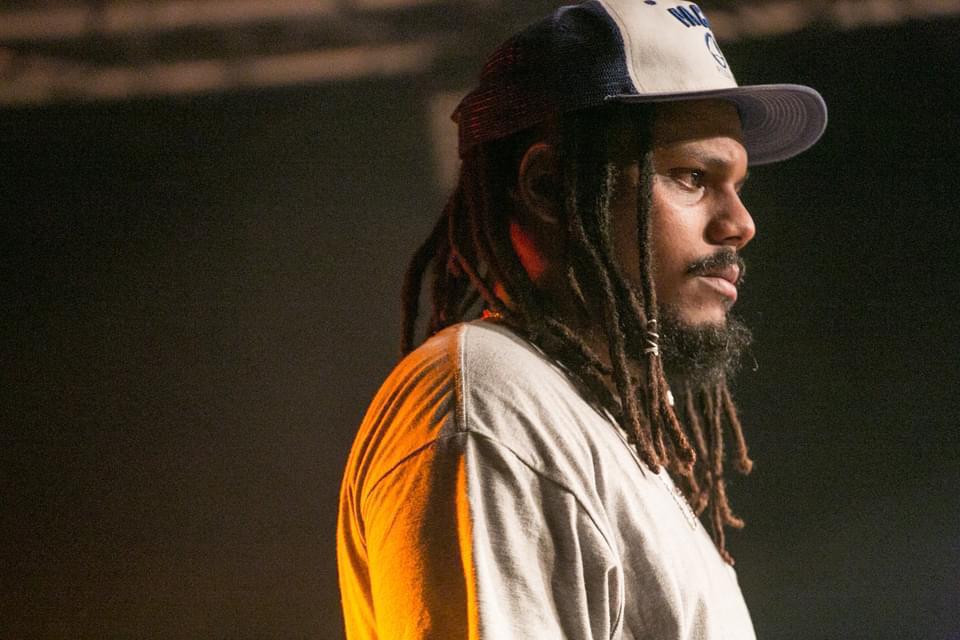


(Havana, Cuba)
All the artists in this project come from a different musical scene/background. From your point of view, how was the experience during the process of adding your personal touch to the project and working with the personal characteristics of each artist?
It was an interesting experience because artists with completely different tastes participated in the project and enriched it. My role as a trumpet player was to play my phrases and solos on the tracks of the producers. I hope you like it.
What did you learn from working with the musicians from Germany that you would like to integrate into your future work?
Well, working with musicians* from Germany was also a super nice experience, because I never had the opportunity to work with artists* from there. From them, I learned this way of making music, this patience and this energy, this vibe they give with their songs.
There are many languages involved in this project (German, Spanish and English), but the only common means of communication is music. Looking at it from this point of view, how was the communication between the team?
Well, it was a bit difficult because there are three languages that converge in this project, but thanks to Ani, who served us as a translator, it was possible. But the music speaks for itself, it’s a universal language and in this project, you can feel this energy, this vibe that transmits the music beyond the languages.
What was the biggest challenge working via web/internet/mobile?
Well, here in Cuba it’s a bit complicated to work remotely because of course the times in Germany and here in Cuba are also different. But well, in the end, it was possible thanks to Ani who always supported us in this, and the fact that the work progressed well and finally turned out super good.
What would you like to tell the audience to expect from the Dimelo Rapeando project?
Well, I would tell the audience to expect an interesting, beautiful work, this mix of two cultures, the German and the Cuban, it’s an interesting mix. From the EP you can expect good vibes, it turned out super interesting and beautiful and I hope you like it, I really do, with all my heart.
What are the disadvantages and advantages of online/internet collaborations?
From a distance, it’s always a bit more complicated when you don’t feel that human warmth and vibe that you always need when it comes to collaborating and making a song or something. But I told you before, here in Cuba the internet is a bit difficult because they shut it down every now and then and it’s a bit expensive and well, but honestly it’s also a disadvantage for you…. You can also do interesting things from a distance, a lot of artists do that, but I’ve always tended to work together with the artists because that’s how you can also convey what you feel and not through a text or a video, or something. For me, it’s much better in person to feel that vibe.
Advantages, like I was just saying, a lot of artists do that nowadays, but actually…. let’s see, of course, it has its advantages in some things, but I don’t know, for example, it gives you the freedom to think a little bit more about the work. I mean, everything happens faster in the studio. So you have more of a chance to think and send ideas to each other, you give yourself more freedom and you can think more about the track you’re doing.
What additional experience were you able to gain from the collaboration and to what extent can/will you use this experience for future projects?
Actually, it was a super nice experience because I had never worked with artists from Germany before and it was something interesting because I got to know their way of thinking because the Cuban musicians’ way of thinking is very different from the German musicians and it was a super rich and rewarding experience and I would like to try to take this experience for future projects as well. I already have some friends there, you guys for example, and the truth is that I would love to do more projects with you guys in the future because it was a super nice experience and the musical level over there is very high.
Because of the pandemic, social media have become even more prominent. What have been your experiences with social media since the beginning of the pandemic? Was it a problem for you that at the moment this is the “only” way to advertise? And how do you use it to spread your music in general?
The truth is that I’ve never used social media that much because the Internet here is very complicated and as I said, Cubans know it very little and I’ve never used it. In fact, I just recently opened my profiles on all the networks. It’s a super nice experience to work through social media and at the moment even more because this human contact of concerts is missing.
When you upload through social media your a video or something and people comment on it and you feel that warmth, even if it’s not live, but still you have that vibe that people create on social media. But I’m telling you, here in Cuba it’s very new, this social media and the spread of music through it, but little by little we adapted to it, we also have to go with the world and we can’t close ourselves to it.
In fact, it’s super nice, isn’t it? It’s something practical that can reach many people of different nationalities, different places, and it’s something that is used a lot today. But I would really like, if it were other times, maybe use a live concert also to spread the music, but well, I think I like this way in this project to communicate with social media. For me it’s good and I see that it’s gaining acceptance and it’s working.
How did you have to adapt your work during this time of the pandemic?
Of course, everything changes because it’s not the same. I would never have thought that we wouldn’t work with musicians, artists in general, because after all, music is an art that depends a lot on the audience and interaction with the audience and losing that is a bit difficult. But at least we musicians use this time to stay up late a lot, to learn things that we didn’t get to before because of the stress of work, at least in Cuba, where there’s a lot of gambling and musicians have to work on two or three projects at the same time, not just because of the income, but because we like to work like that. But now I have taken this time to make my music, that is, before I could not because of time. Now I’ve focused more on myself, on my music, on this super beautiful project Dímelo Rapeando. Basically, that’s it: practicing a lot, doing projects that were unfinished, making my own creations and things that I had inside me that I wanted to put out there.
The interview was conducted on 02/16/2021 via FaceTime.
Interview: Maria Quirós
Transcription, translation and fair copy: Roman Oria, Maria Quirós, Helene Heuser

(c) Fotocredit
Biography
Raciel Aldama Chiroles, Cuban trumpet player, graduated from the Amadeo Roldan Conservatory of Music in Havana. His music has been influenced by different artists of contemporary music such as Robert Glasper, Thundercat, JCole, Kendrick Lamar, Christian Scott, among others. He has collaborated with top Cuban artists such as Giraldo Piloto, Boby Carcacés, Leo Vera, José Portillo, Real Project, Carlos Acosta. The experience gained through his knowledge of music and its musical influences have led him to integrate as a music producer, within the Hip Hop genre. His experience and musical contributions helped him to become one of the producers of the Cuban independent label “El Espacio”, collaborating with several artists of the urban genre that belong to this label.